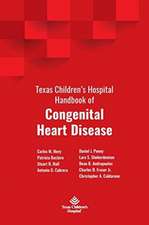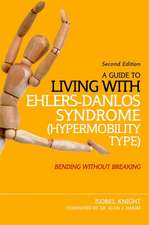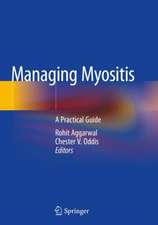A Multi-Disciplinary Approach to Managing Ehlers-Danlos (Type III) - Hypermobility Syndrome: Working with the Chronic Complex Patient
Autor Isobel Knighten Limba Engleză Paperback – 14 mar 2013
Preț: 216.49 lei
Preț vechi: 290.42 lei
-25% Nou
Puncte Express: 325
Preț estimativ în valută:
41.43€ • 42.93$ • 34.58£
41.43€ • 42.93$ • 34.58£
Carte disponibilă
Livrare economică 01-15 martie
Livrare express 15-21 februarie pentru 96.33 lei
Preluare comenzi: 021 569.72.76
Specificații
ISBN-13: 9781848190801
ISBN-10: 1848190808
Pagini: 360
Ilustrații: 20 black & white illustrations
Dimensiuni: 152 x 228 x 22 mm
Greutate: 0.53 kg
Editura: Singing Dragon
ISBN-10: 1848190808
Pagini: 360
Ilustrații: 20 black & white illustrations
Dimensiuni: 152 x 228 x 22 mm
Greutate: 0.53 kg
Editura: Singing Dragon
Notă biografică
Isobel Knight is a writer, researcher and periodic lecturer on Ehlers-Danlos (Type III) Hypermobility Syndrome. Isobel is also a practising Bowen Therapist and lives in South London.
Cuprins
Acknowledgements. Preface. Introduction. Part I. The Body and the Self. 1. The Body and the Self in Illness and Health and Autoethnographical Writing. 2. Isobel's Story. 3. Visit to Consultant Rheumatologist, Professor Howard Bird. 4. Implications of Diagnosis. Part II. Physiology. 5. Maslow Hierarchy of Needs and Homeostasis. 6. Postural Orthostatic Tachycardia Syndrome (POTS) and Autonomic Nervous System (ANS). 7. Digestion and Bowel. 8. Bladder. 9. Surgical and Nursing Implications for the EDSIII/Chronic Complex Patient. 10. Hormonal Aspects of Hypermobility and Living with Endometriosis. 11. Sleep and Fatigue. 12. Fatigue and Unexpected Responses to Treatment and Incidents. 13. Crisis, Flare-ups and Management. 14. The Chronic Complex Patient and Pain Management. Part III. Psychology. Psychology Preface. 15. How Patients Present Themselves ? Isobel's Experience as a Bowen Therapist and Rosemary Keer's Experience as a Physiotherapist. 16. The Physiotherapist and Patient Relationship. 17. Goal-setting and Patient Review. 18. Trust (and Economics). 19. The Challenging Patient. 20. The Doctor/Patient Relationship and Treatment of Chronic Complex Patients. 21. Learning Styles and Learning 'Difficulties'. 22. Social Media, Forums and Support Groups. 23. Self Harm, Anxiety and Depression. 24. Cognitive Analytical Therapy (CAT). 25. Managing Chronic Complex Patients with Psychological Issues ? Isobel's Personal Reflection. 26. Terminating Client Relationships. 27. I'm Not Mad; I have EDS so Why do I Need to see a Psychologist? Dr Andrew Lucas' Account of Treating EDS Patients at the Royal National Orthopaedic Hospital. Part IV. Exercise and Rehabilitation. 28. Exercise and Rehabilitation ? EDS Patient Experience of Physiotherapy and Isobel's 'Stages' of Treatment. 29. Imaging Exercises and 'Less is More'. 30. Pilates and 'Physiolattes' ? Core Stability and Lumbar Spine. 31. Movement Patterns; Overuse and Muscle Stiffness. 32. Neurology and Movement Disorders. 33. Subjective Outcomes. 34. Returning to Normal Life. 35. Speech, Swallowing, TMJ and Eye Problems. 36. Cervical Spine. 37. The Trauma of Birth and Post Traumatic Stress Disorder. 38. Bowen Technique and Working on Fascia and Connective Tissue Disorders. 39. Feldenkrais Method®. 40. Cardiovascular and Endurance Work. 41. Isobel 'Now' and Thoracic Spine. 42. Conclusion. Appendix 1. Sample Forms. Appendix 2. Useful Contacts. Appendix 3. Diagnostic Criteria. Bibliography. Index.
























